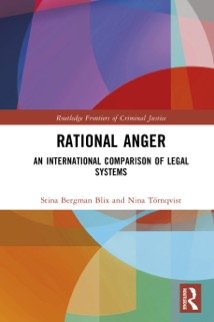By Stina Bergman Blix and Nina Törnqvist
Exploring the rationales behind legal anger, its logic and origins, this book builds on the perspectives of judges and prosecutors in Italy, Sweden, the United States, and Scotland. When do judges and prosecutors become angry in court, what do they become angry about, and which other emotions open up for anger? Anger brings people to court and is essential in evaluating wrongdoing and attributing blame, but at the same time, anger is seen as a threat to well-reasoned and just decision-making. Drawing on observations, interviews, and shadowing of legal professionals, the text demonstrates how anger is entangled with legal thought and comes into play in legal practices. By comparing the workings and displays of anger found in different legal systems and emotional cultures, the book elucidates assumptions about law, morality, truth, and emotions that we commonly take for granted. Rational Anger will be of great interest to students and scholars of criminology, criminal justice, sociology, law, social psychology, and organisation studies.
Oxford, UK; New York: Oxford University Press, 2025. 124p.


